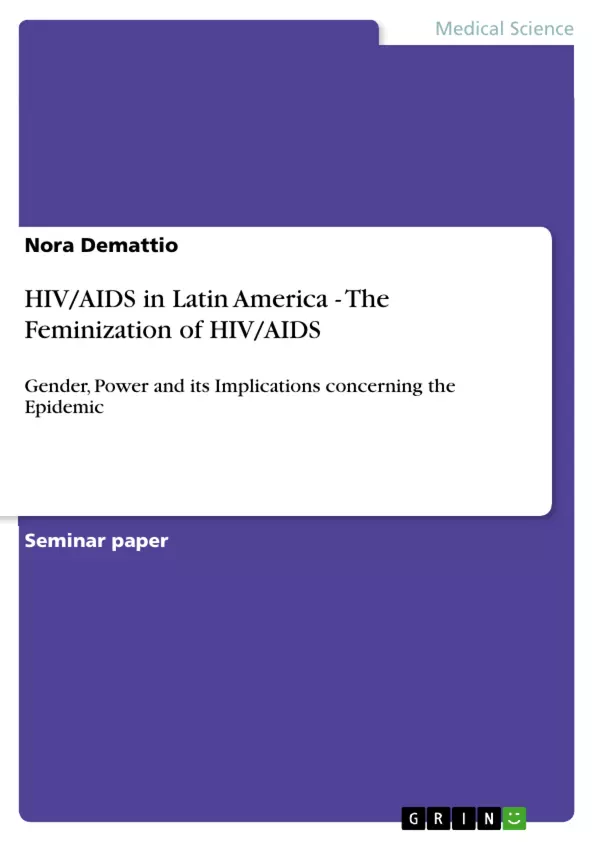Around the world, in the last decades since the appearing of HIV/AIDS, the prevalence of women infected by HIV is raising faster than the prevalence of men. Although this development had been recognized soon, it was not posible to stop it.
On the basis of these facts, I will have a closer look at the situation of women in Latin America concerning the disease and I want to review the “feminization” of HIV/AIDS.
Furthermore, I will give an overview of two Gender constructing concepts of Latin America, Machismo and Marianismo, which I seek to challenge in its impacts on (the development of) programs and organsisations concerning the epidemic, and following, in women.
Inhaltsverzeichnis (Table of Contents)
- 1. Introduction
- 2. Women and HIV/AIDS in Latin America
- 3. Machismo and Marianismo – Gender Constructions in Latin America
- 3.1 Machismo
- 3.2 Marianismo
- 3.3 Implications for Women and for Programs and Organsisations concerning HIV/AIDS.
- 4. Conclusio
Zielsetzung und Themenschwerpunkte (Objectives and Key Themes)
This paper investigates the rising prevalence of HIV/AIDS among women in Latin America. It examines the "feminization" of the epidemic and delves into the social constructs of Machismo and Marianismo, analyzing their impact on programs and organizations aimed at combating the disease, as well as their effects on women's health.
- The feminization of the HIV/AIDS epidemic in Latin America
- The role of gender constructions in shaping the epidemic
- The impact of Machismo and Marianismo on women's health
- The implications of these gender constructs for HIV/AIDS prevention programs
- The need for gender-sensitive approaches to HIV/AIDS prevention and treatment
Zusammenfassung der Kapitel (Chapter Summaries)
The paper begins by highlighting the alarming trend of rising HIV/AIDS prevalence among women in Latin America, particularly in the context of a relatively stable overall infection rate. It attributes this development to factors like transmission from men who engage in risky behaviors, such as injecting drug use or unprotected sex, to their female partners.
Chapter 3 delves into the concepts of Machismo and Marianismo, exploring their historical context and the influence of colonialism and the Catholic Church on their formation. The paper argues that these gender constructs reinforce traditional roles and power imbalances between men and women, contributing to the vulnerability of women to HIV/AIDS. Machismo is characterized as an exaggerated form of masculinity emphasizing dominance over women, while Marianismo represents an idealized femininity that promotes submissiveness and sexual purity.
Schlüsselwörter (Keywords)
The main keywords and focus topics of this work include HIV/AIDS in Latin America, gender constructions, Machismo, Marianismo, the feminization of the epidemic, gender-sensitive approaches to prevention and treatment, and the impact of these social constructs on women's health.
Frequently Asked Questions about HIV/AIDS in Latin America
What is meant by the "feminization" of HIV/AIDS?
It refers to the trend where the prevalence of HIV infections among women is rising faster than among men, making women increasingly vulnerable to the epidemic.
How do Machismo and Marianismo affect women's health?
These gender constructs reinforce power imbalances: Machismo emphasizes male dominance, while Marianismo promotes submissiveness, both of which can limit a woman's ability to negotiate safe sex.
What is the role of the Catholic Church in these gender constructs?
The paper explores how colonialism and the Catholic Church influenced the formation of traditional gender roles like Marianismo in Latin America.
Why is a gender-sensitive approach necessary for HIV prevention?
Traditional programs often fail to address the specific social and cultural vulnerabilities of women; therefore, sensitive approaches are needed to effectively combat the feminization of the disease.
Is the overall HIV infection rate in Latin America rising?
The paper notes that the prevalence among women is rising even while the overall infection rate in the region remains relatively stable.
- Citation du texte
- BA Nora Demattio (Auteur), 2009, HIV/AIDS in Latin America - The Feminization of HIV/AIDS , Munich, GRIN Verlag, https://www.grin.com/document/187459



